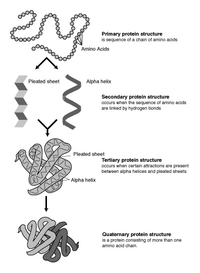
Early‐Stage Incorporation Strategy for Regioselective Labeling of Peptides using the 2‐Cyanobenzothiazole/1,2‐Aminothiol Bioorthogonal Click Reaction
Sign Up to like & getrecommendations! Published in 2018 at "ChemistryOpen"
DOI: 10.1002/open.201700191
Abstract: Abstract Herein, we describe a synthetic strategy for the regioselective labeling of peptides by using a bioorthogonal click reaction between 2‐cyanobenzothiazole (CBT) and a 1,2‐aminothiol moiety. This methodology allows for the facile and site‐specific modification… read more here.
Keywords: click reaction; strategy regioselective; labeling peptides; reaction ... See more keywords

Peptide oligomers from ultra-short peptides using sortase
Sign Up to like & getrecommendations! Published in 2017 at "Biochemistry and Biophysics Reports"
DOI: 10.1016/j.bbrep.2017.02.005
Abstract: Sortase A catalyzed ligation of ultra-short peptides leads to inter/intra-molecular transpeptidation to form either linear or cyclic oligomers dependent upon the peptide length. Cyclic peptides were the main products for peptides with more than 15aa.… read more here.
Keywords: oligomers ultra; short peptides; peptide oligomers; ultra short ... See more keywords

Deorphanizing Peptides Using Structure Prediction
Sign Up to like & getrecommendations! Published in 2023 at "Journal of chemical information and modeling"
DOI: 10.1021/acs.jcim.3c00378
Abstract: Many endogenous peptides rely on signaling pathways to exert their function, but identifying their cognate receptors remains a challenging problem. We investigate the use of AlphaFold-Multimer complex structure prediction together with transmembrane topology prediction for… read more here.
Keywords: using structure; peptides using; prediction; deorphanizing peptides ... See more keywords

Chemically Diverse Helix-Constrained Peptides Using Selenocysteine Crosslinking.
Sign Up to like & getrecommendations! Published in 2018 at "Organic letters"
DOI: 10.1021/acs.orglett.8b00233
Abstract: The use of selenocysteines and various cross-linkers to induce helicity in a bioactive peptide is described. The higher reactivity of selenocysteine, relative to cysteine, facilitates rapid cross-linking within unprotected linear peptides under mild aqueous conditions.… read more here.
Keywords: using selenocysteine; chemically diverse; diverse helix; helix constrained ... See more keywords

SCMRSA: a New Approach for Identifying and Analyzing Anti-MRSA Peptides Using Estimated Propensity Scores of Dipeptides
Sign Up to like & getrecommendations! Published in 2022 at "ACS Omega"
DOI: 10.1021/acsomega.2c04305
Abstract: Staphylococcus aureus is deemed to be one of the major causes of hospital and community-acquired infections, especially in methicillin-resistant S. aureus (MRSA) strains. Because antimicrobial peptides have captured attention as novel drug candidates due to… read more here.
Keywords: peptides using; propensity scores; anti mrsa; mrsa peptides ... See more keywords

SignalP 6.0 predicts all five types of signal peptides using protein language models
Sign Up to like & getrecommendations! Published in 2022 at "Nature Biotechnology"
DOI: 10.1038/s41587-021-01156-3
Abstract: Signal peptides (SPs) are short amino acid sequences that control protein secretion and translocation in all living organisms. SPs can be predicted from sequence data, but existing algorithms are unable to detect all known types… read more here.
Keywords: predicts five; signalp predicts; five types; peptides using ... See more keywords

One-pot chemical pyro- and tri-phosphorylation of peptides by using diamidophosphate in water
Sign Up to like & getrecommendations! Published in 2022 at "Chemical Science"
DOI: 10.1039/d2sc04160j
Abstract: Protein (pyro)phosphorylation is emerging as a post-translational modification (PTM) in signalling pathways involved in many cellular processes. However, access to synthetic pyrophosphopeptides that can serve as tools for understanding protein pyrophosphorylation is quite limited. Herein,… read more here.
Keywords: peptides using; phosphorylation; pot chemical; one pot ... See more keywords

Accelerating the discovery of antifungal peptides using deep temporal convolutional networks
Sign Up to like & getrecommendations! Published in 2022 at "Briefings in bioinformatics"
DOI: 10.1093/bib/bbac008
Abstract: The application of machine intelligence in biological sciences has led to the development of several automated tools, thus enabling rapid drug discovery. Adding to this development is the ongoing COVID-19 pandemic, due to which researchers… read more here.
Keywords: antifungal peptides; accelerating discovery; peptides using; discovery antifungal ... See more keywords

Screening and Optimizing Antimicrobial Peptides by Using SPOT-Synthesis
Sign Up to like & getrecommendations! Published in 2017 at "Frontiers in Chemistry"
DOI: 10.3389/fchem.2017.00025
Abstract: Peptide arrays on cellulose are a powerful tool to investigate peptide interactions with a number of different molecules, for examples antibodies, receptors or enzymes. Such peptide arrays can also be used to study interactions with… read more here.
Keywords: optimizing antimicrobial; screening optimizing; using spot; antimicrobial peptides ... See more keywords

Identify Bitter Peptides by Using Deep Representation Learning Features
Sign Up to like & getrecommendations! Published in 2022 at "International Journal of Molecular Sciences"
DOI: 10.3390/ijms23147877
Abstract: A bitter taste often identifies hazardous compounds and it is generally avoided by most animals and humans. Bitterness of hydrolyzed proteins is caused by the presence of bitter peptides. To improve palatability, bitter peptides need… read more here.
Keywords: bitter peptides; representation learning; peptides using; deep representation ... See more keywords